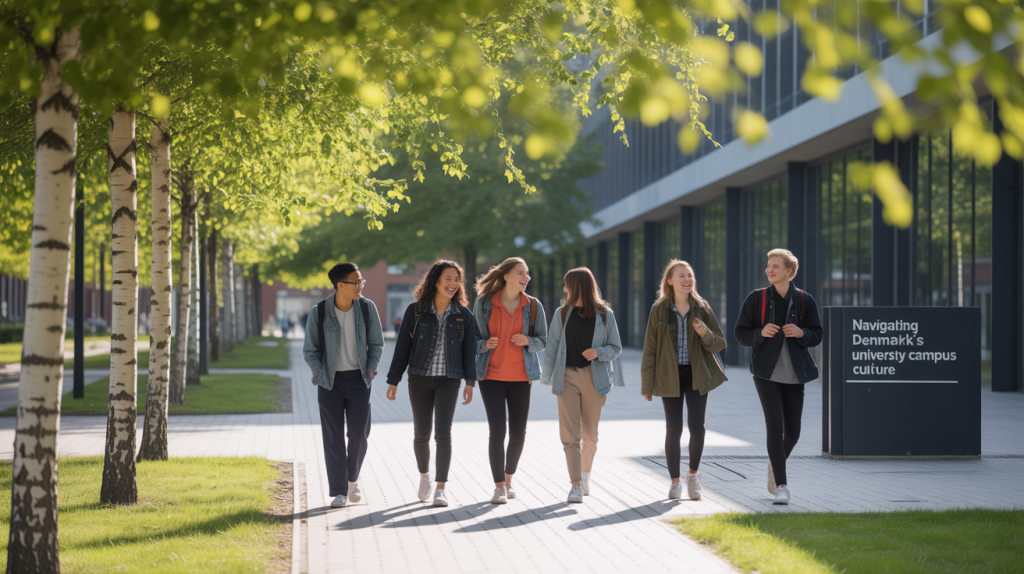How to Navigate Denmark’s University Campus Culture
Understanding the Academic Environment
Danish higher education is known for its progressive approach that focuses on promoting critical thinking, creativity, and teamwork skills. The academic culture emphasizes active learning, project-based work, and open debate—elements that prepare students for their future careers. As a student in Denmark, you can expect to engage in:
- Active Participation: Students are encouraged to participate in discussions and voice their opinions, fostering an environment of open dialogue.
- Independent Thinking: There is a strong emphasis on developing your own viewpoints and conducting independent research.
- Collaborative Problem-Solving: Many projects require teamwork, allowing you to learn from peers while developing interpersonal skills.
The relationship between students and faculty is characterized by a flat hierarchy. This informal academic setting might be different from what you are used to, but it creates a learning atmosphere where every idea is valued.
Campus Life and Facilities
Danish universities are well-equipped with facilities that support both academic endeavors and social interactions. Campus areas often feature:
- Libraries: Equipped with extensive resources to aid your studies.
- Cafés: Casual meeting spots for friends and group work.
- Dedicated Meeting Places: Spaces designed for group projects and collaboration.
- Sports Facilities: Gyms and arenas for fitness and recreational activities.
For instance, at Campus Viborg, students benefit from a gym that hosts sports competitions, Zumba classes, and various other activities promoting health and well-being.
These facilities play a crucial role in creating a supportive community that facilitates both academic work and social interactions. Engaging with these resources can help you build connections and optimize your study experience.
Maintaining a Work-Study Balance
Balancing work and study is essential in Denmark. The educational system encourages students to gain practical experience alongside their academic pursuits. Most degree programs are structured to accommodate part-time employment, which can be highly beneficial for gaining work experience.
However, it’s crucial to maintain your full-time study requirements. Here are some tips for striking that balance effectively:
- Time Management: Organizing your study schedule and working hours will allow you to manage both responsibilities efficiently.
- Set Priorities: Make a list of tasks and deadlines to stay focused on your academic commitments.
- Observe Academic Expectations: Understanding the requirements for exams and project submissions early on can help you prepare effectively.
Self-directed learning is at the heart of the Danish educational experience; thus, being organized will pave the way for your success.
Adapting to Danish Cultural Norms
Understanding Danish cultural norms can significantly enhance your experience on campus. Here are some key aspects:
- Punctuality: Being on time for classes, meetings, and social events is highly valued in Danish culture.
- “Janteloven” (Law of Jante): This cultural principle promotes humility and collective success over individual achievement, encouraging a collaborative spirit.
- Direct Communication: Danes are known for their straightforwardness; this honesty in communication fosters trust and clarity.
By embodying these cultural norms, you will find it easier to integrate into university life and connect with others in the community.
Connecting with Study in Denmark’s Services
At Study in Denmark, we understand the complexities of navigating the educational landscape in Denmark, especially for international students. Our platform provides valuable resources to help students and recruiters alike:
- Insights into the Danish education system and institutions.
- Guidance on student recruitment strategies.
- Support for agencies engaged in student placement and educational technology.
We are committed to facilitating a smooth transition for international students, ensuring they can thrive in their academic journeys.
Conclusion and Call to Action
Navigating Denmark’s university campus culture involves understanding the academic environment, participating in social activities, achieving a work-study balance, and adapting to cultural norms. As you embark on this journey, remember that engaging with the community and resources available to you will significantly enhance your experience.
Take the Next Step with Study in Denmark
Explore further educational opportunities and resources tailored for you. Join our community and enhance your academic experience in Denmark.





Participating in Social Activities and Traditions
Campus life in Denmark also includes various social activities that help students integrate into the community. One of the most notable traditions is the “Friday Bar.” These informal gatherings encourage socializing and networking, often taking place on campus and providing an excellent opportunity to meet new friends from diverse backgrounds.
Other popular social activities include:
Engaging in these activities is a great way to experience Danish culture first-hand and establish lasting friendships with both local and international peers.